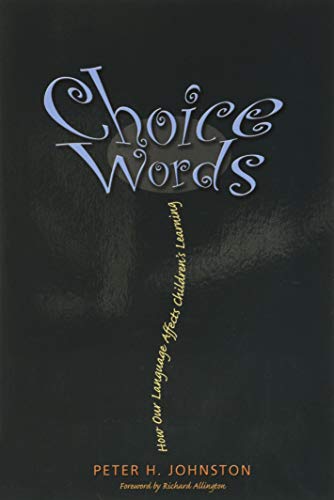Choice Words
Think you might want to read this book?
Have you ever run a class discussion and felt you didn’t get the best from your students? Have you ever tried to guide a student and felt that the perfect words just wouldn’t come? Peter Johnston has written Choice Words with exactly those moments in mind. You will be challenged to reframe the way you ask questions and respond to students so they feel valued and land on the learning themselves. A great read for… well, all of us!
What Would Socrates Ask?
What if teachers started sentences with “Did anyone notice…?”
What if teachers asked “What patterns are you noticing?” more to encourage longitudinal analysis?
What if teachers asked students “What surprised you?” more to encourage sharing reactions?
What if you said “What a talented __ you are.” more often?
What if teachers followed negative behavior with “That’s not like you.”?
What if you asked “How did you ___?” and “How are you going to ___?” more often?
What if you intentionally asked students a question that starts with “Why” every five minutes in a class?
What if we flipped “wait time” to the student perspective and called it “thinking time”?
What if we built in paired and triad opportunities for collaborative thinking at strategic intervals in a lesson?
Research
Most accomplished teachers do not spend a lot of time in telling mode.
Developing in children a sense of agency is not an educational frill or some mushy-headed liberal idea. Children who doubt their competence set low goals and choose easy tasks, and they plan poorly. When they face difficulties, they become confused, lose concentration, and start telling themselves stories about their own incompetence. In the long run they disengage, decrease effort, generate few ideas, and become passive and discouraged. Children with strong belief in their own agency work harder, focus their attention better, are more interested in their studies, and are less likely to give up when they encounter difficulties than children with a weaker sense of agency.
Concepts
Partially correct- Focus on what the students got right and build from there.
Quotes from the author
“… there are hidden costs in telling people things. If a student can figure something out for him- or herself, explicitly providing the information preempts the student’s opportunity to build a sense of agency and independence, which, in turn, affects the relationship between teacher and student. Think about it. When you figure something out of yourself, there is a certain thrill in the figuring.”
“Language, then, is not merely representational (though it is that): it is also constitutive. It actually creates realities and invites identities.”
“...telling children they can have free choice time, ‘but first we have to finish our reading,’ positions reading poorly simply by using the words ‘have to.’”
“Why questions are the essence of inquiry. Once young children latch onto ‘why’ questions, they come to see how useful they are for getting to the bottom of how (some) things work and finding the limits of others.”
“Else is a very powerful word. It simultaneously builds flexibility and implies a range of other important messages.”
“Thinking flexibly and metaphorically involves expanding the imagination, and what-if questions insist on an imaginative act. What-if questions can be used to expand the context in which particular strategies might be used, or particular identities might hold sway.”
“By reflecting to the students their comments, the teacher at once validates their voice, shows that she is listening, and opens the possibility for them to reflect on, modify, or challenge what has been said.”
“Understanding that it is acceptable, indeed normal, to disagree, and that people have legitimate opinions that differ, is necessary for participating in a democratic society.”
“‘I wonder …’ represents a class of linguistic lubricants. It marks the offering of a possible hypothesis, or a tentative idea with an invitation, but not an instance to pick it up and improve it or take it further.”
Quotes from others
“Children grow into the intellectual life around them.” - Vygotsky
“The better you know something, the more risk there is of behaving egocentrically in relation to your knowledge. Thus, the greater the gap between teacher and learner, the harder teaching becomes.” - Margaret Donaldson
“Language is the essential condition of knowing, the process by which experience becomes knowledge.” - Halliday
Implement tomorrow
Use the word like intentionally as it has two primary functions. It draws attention to connections (with other experiences, books, authors, situations, practices, words, and so forth) and it makes metaphors, both of which are fundamental not only to transfer, but also to understanding and reasoning.
Referenced books with the potential to impact leading and learning in education
The applicability of this book to education is ….
Resources






